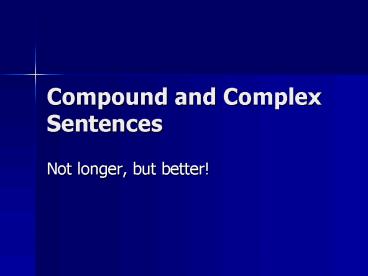Compound and Complex Sentences - PowerPoint PPT Presentation
1 / 12
Title:
Compound and Complex Sentences
Description:
INDEPENDENT CLAUSE dependent clause (no comma) ... The independent clauses are underlined, and the coordinating conjunctions are in ... – PowerPoint PPT presentation
Number of Views:1790
Avg rating:3.0/5.0
Title: Compound and Complex Sentences
1
Compound and Complex Sentences
- Not longer, but better!
2
Compound sentence
- A compound sentence has two or more independent
clauses joined by a coordinating conjunction - INDEPENDENT CLAUSE, COORDINATING CONJUNCTION
INDEPENDENT CLAUSE - Henry got a new job, so he has to move.
- I have a lot of homework, but I am not going to
study tonight.
3
Notice the difference between a simple sentence
with a compound verb and a compound sentence with
two clauses
SIMPLE My house guests returned from a long day
of shopping and went straight to
bed. COMPOUND My house guests returned home from
a long day of shopping, and we decided to stay at
home instead of going out. What is the
difference?
4
Compound sentence with coordinating conjunctions
- Most compound sentences are formed with a
coordinating conjunction and, or, but, so, for,
nor, yet. The last three occur almost exclusively
in writing, so they add a level of formality - The experiment was deemed successful, yet our
results were unsatisfactory. - The students were unhappy with their professor,
for he often wasted their time in class.
5
Complex sentence
- A complex sentence has an independent clause with
one or more dependent clauses (independent
clauses are in italics) - Since we got to the concert late, we had to make
our way to our seats in the dark. - We left class early so that we could attend a
special lecture.
6
Complex sentences should be punctuated in one of
two ways
- INDEPENDENT CLAUSE dependent clause (no comma)
- We left class early so that we could attend a
special lecture. - Dependent clause, INDEPENDENT CLAUSE (comma)
- So that we could attend a special lecture, we
left class early.
7
Comparing compound and complex sentences
- interest, variety, and coherence
- compound sentences differ from complex sentences
in one important way In a compound sentence,
both clauses have equal importance in a complex
sentence, the independent clause is more
important.
8
Compare these sentences
- COMPOUND John was tired, but he finished his
homework. - COMPLEX Although John was tired, he finished his
homework. - In the first sentence, the writer is
communicating that both clauses are equally
important. In the second sentence, the writer is
saying that the subordinate clause ("John was
tired") is less important than the independent
clause ("he finished his homework").
9
Long, rambling sentences
- Writing that has too many strings of independent
clauses joined by coordinating conjunctions can
be tiresome and frustrating for the reader. - These long rambling sentences leave the reader
out of breath and wondering which information is
important. - Long rambling sentences are also perceived as
informal because they duplicate spoken language
10
Look at this paragraph with many independent
clauses joined with coordinating conjunctions
- I went home, but my roommate wasn't there, so I
started to cook dinner, but my roommate came in
and saw me trying to cook his favorite recipe,
but I didn't really know how to make it well, and
he got really angry, so I stopped cooking, and he
made dinner for us, and then everything was all
right.
11
The independent clauses are underlined, and the
coordinating conjunctions are in bold
- 1 went home, but my roommate wasn't there, so I
started to cook dinner, but my roommate came in
and saw me trying to cook his favorite recipe,
but I didn't really know how to make it well, and
he got really angry, so I stopped cooking, and he
made dinner for us, and then everything was all
right.
12
This is better! Notice how it makes use of a
variety of sentence structures.
- When I went home, my roommate wasn't there, so I
started to cook dinner. Then, my roommate came in
and saw me trying to cook his favorite recipe
even though I didn't know how to make it well. I
stopped cooking because he got really angry. In
the end, he made dinner for us, and everything
was all right.































